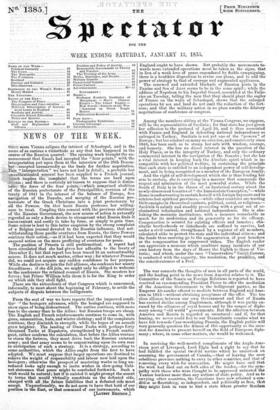Among the members sitting at the Vienna Congress, we suppose,
will be the representative of Sardinia ; for that state has just given her adhesion to the protocol of April 10, and is thus associated with France and England in defending national independence as outraged in Turkey. Sardinia is not yet one of the "powers" of Europe ; but her conduct on many an occasion, and consistently since 1848, liairbeen such as to stamp her acts with wisdom, courage, and honesty. She has no direct interest in the question of the Holy Places, or in the integrity of Turkey, and only the ordinary commercial interest in the navigation of the Danube ; but she has a vital interest in keeping back the Absolute spirit which is in- compatible with her political welfare, in sustaining the principle that each state is entitled to an independent power of self-develop- ment, and in being recognized as a member of the European family.
And the right of self-development which she is thus lending her arm to sustain, she is exercising in a manner that commands the respect and admiration of the most powerful states. 'While the South of Italy is in the throes of an hysterical eestacy about the newly-discovered beauties of " the Immaculate Conception,"—while Rome is endeavouring to sustain herself with foreign bayonets and to retrieve lost spiritual provinces,—while other countries are wasting tlietrenergies in theoretical contests, political, social, or religious,— Sardinia is calmly and steadily proceeding with a great act of ec- clesiastical reformation and national independence. She is abo- lishing the monastic institutions, with a measure remarkable as much for its moderation and its generosity as for its efficacy. Compensation is secured for existing officers and inmates ; cha- ritable brotherhoods or bisterhoods are suffered to survive, but under a civil control, strengthened by a register of all members, calculated alike to protect the state and the individual citizen; and the funds thus accruing go to the augmentation of poor benefices or the compensation for suppressed -tithes. The English reader can appreciate a measure which combines many incidents of our own history from the days of Henry the Eighth to those of Vic- toria; and which, under the once " Conservative " CoatitUavour, is conducted with the sagacity, the resolution, the prude-nee, and the considerateness of a Peel.






























